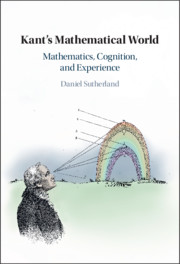Book contents
- Kant’s Mathematical World
- Kant’s Mathematical World
- Copyright page
- Dedication
- Contents
- Preface and Acknowledgments
- 1 Introduction
- Part I Mathematics, Magnitudes, and the Conditions of Experience
- Interlude The Greek Mathematical Tradition as Background to Kant
- Part II Kant’s Theory of Magnitudes, Intuition, and Measurement
- 7 Kant’s Reworking of the Theory of Magnitudes
- 8 Kant’s Revision of the Metaphysics of Quantity
- 9 From Mereology to Mathematics
- 10 Concluding Remarks
- Bibliography
- Index
8 - Kant’s Revision of the Metaphysics of Quantity
from Part II - Kant’s Theory of Magnitudes, Intuition, and Measurement
Published online by Cambridge University Press: 21 October 2021
- Kant’s Mathematical World
- Kant’s Mathematical World
- Copyright page
- Dedication
- Contents
- Preface and Acknowledgments
- 1 Introduction
- Part I Mathematics, Magnitudes, and the Conditions of Experience
- Interlude The Greek Mathematical Tradition as Background to Kant
- Part II Kant’s Theory of Magnitudes, Intuition, and Measurement
- 7 Kant’s Reworking of the Theory of Magnitudes
- 8 Kant’s Revision of the Metaphysics of Quantity
- 9 From Mereology to Mathematics
- 10 Concluding Remarks
- Bibliography
- Index
Summary
Chapter 8 focuses on Kant’s reaction to the metaphysics of quantity found in Leibnizian and Wolffian rationalism. Leibniz had broad ambitions for a unified theory of all knowledge that subsumed mathematics under metaphysics. Leibniz accordingly sought metaphysical definitions of quality and quantity that in turn supported metaphysical definitions of similarity and equality as identity of quality and quantity, respectively. A criterion of success was that these definitions corresponded to Euclid’s geometrical notions of similarity and equality. This chapter examines Leibniz, Wolff, and Baumgarten’s views of quality and quantity and the contrast between them, which was closely tied to the conditions of their representation and distinct cognition. Kant adopts some of their understanding of the metaphysics of quantity, such as the definitions of similarity and equality as identity of quality and quantity, respectively. At the same time, he radically reforms it. Kant distinguishes between two notions of quantity, quanta and quantitas, and hence draws two contrasts with two corresponding notions of quality: quality versus quantum, and quality versus quantitas. Most importantly, Kant holds that quanta require intuition for their representation. This preserves the general framework of the Leibnizian and Wolffian metaphysics of quantity while radically reforming it at its foundation.
- Type
- Chapter
- Information
- Kant's Mathematical WorldMathematics, Cognition, and Experience, pp. 219 - 239Publisher: Cambridge University PressPrint publication year: 2021



